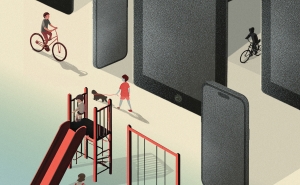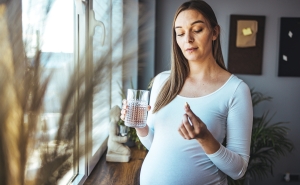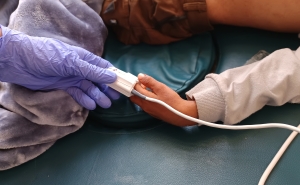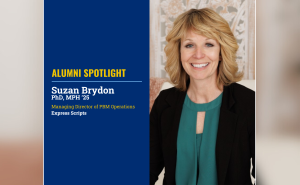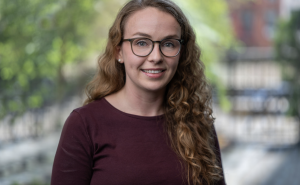Two New RSV Products to Protect Infants
A new vaccine for pregnant people and an antibody treatment for babies could substantially lower the rates of severe RSV infections among children, but rollout has been slow ahead of the first RSV season the products are available.
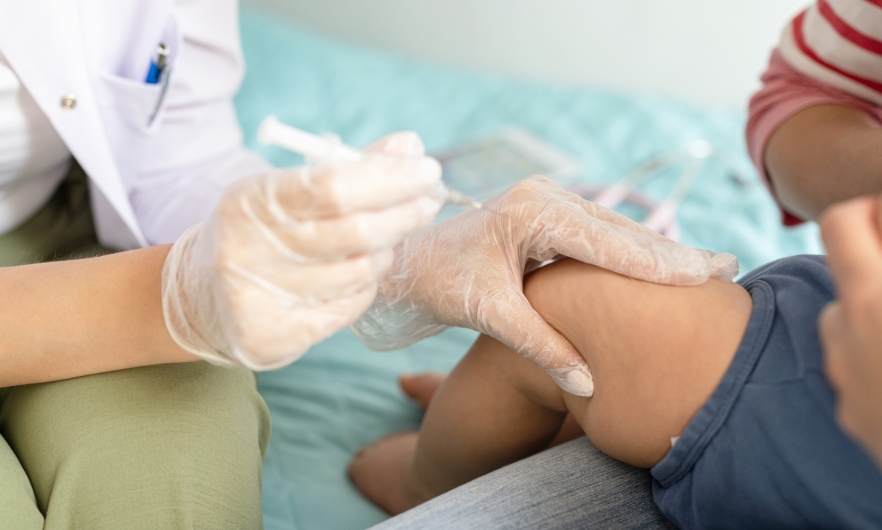
Virtually all children get an RSV infection by the time they are 2 years old. The virus generally causes cold-like symptoms, but infections can become severe in young children; every year in the U.S., an estimated 58,000-80,000 kids under 5 are hospitalized due to RSV infection.
Earlier this year, two new products were approved to help protect infants from severe disease: a vaccine for pregnant people and an antibody treatment for babies. However, as we head into winter—when RSV transmission rates are highest—availability of these products is lacking, and people may still have a hard time getting them, says Ruth Karron, MD, a professor in International Health and director of the Johns Hopkins Center for Immunization Research. In this Q&A with Josh Sharfstein, MD, adapted from an episode of Public Health On Call, Karron discusses these two new products, how they should be used, and why she’s been referring to 2023 as “the year of RSV.”
What exactly is RSV?
RSV stands for respiratory syncytial virus. This is a virus that can infect people of all ages, but can cause severe disease in infants and young children. In the U.S., it’s the leading cause of hospitalization for children under 1 year of age. Even for children who aren't hospitalized, it can still result in absence from daycare and parents having to take time off from work.
Typically, RSV is a wintertime virus that usually starts circulating in our area in Maryland around the end of October, early November, and then lasts through March. That said, RSV trends in the last couple of years have differed because of the COVID pandemic and some of our behavior patterns.
Are some babies at higher risk for severe RSV disease than others?
A child is at greater risk of severe disease if they are a premature baby, have heart disease, or have neurologic problems that cause difficulty in swallowing and therefore problems with their lungs. But when we look at the population of children who are hospitalized with RSV every year, about 75% to 85% of those children are babies who are born full term and have absolutely no risk factors, but were just born a couple of months before the RSV season.
While RSV is the leading cause of hospitalization for children under a year old in the U.S., it's typically most severe in infants under 6 months of age. During typical non-pandemic times, one reason for this is that children's airways are tiny at that age. RSV infection causes a lot of mucus production, and those tiny airways get clogged from inflammation and mucus.
Before this year, what was available to protect infants from RSV?
What was available—and still remains available, at least this year—is a product called palivizumab, or Synagis, which is an antibody to RSV. It has to be given every month during the RSV season, and it's very expensive; it costs families thousands of dollars every season. Because of that, it's really only available in wealthy countries, but even in wealthy countries like the U.S., there are real limitations on its use.
Because of the expense and the difficulty of readministering it every month during RSV season, the American Academy of Pediatrics has recommended that palivizumab not even be used for all premature infants, but just the very premature infants during their first few months of age.
There are new products available this year to protect babies from RSV. What are they?
Back at the start of this year, I referred to 2023 as “the year of RSV,” and now that we’re getting to the end of this year, that’s really proven to be true. That’s because we now have two products that are highly effective at protecting babies under 6 months of age.
One is nirsevimab, or Beyfortus, which is made by AstraZeneca and marketed by Sanofi. It’s an antibody like Synagis but with two really important differences: First, it’s long lasting, so a single dose will protect a baby for the whole RSV season. The other important difference is it costs a lot less, about $500. That's a lot of money, but it's a lot less than Synagis.
To be clear, this is an antibody, not a vaccine. So once it’s out of the baby’s system, the baby doesn't have any immunity left to RSV. But they are protected during that really vulnerable time.
There is another product called RSVpreF, or Abrysvo, which is also approved for people over 60. Abrysvo has been licensed to be given to pregnant people during their third trimester, in order to boost their own antibodies; those antibodies are then passed on to the baby.
Both Beyfortus and Abrysvo are highly effective at preventing RSV in young infants, on the order of 75% to 85% protection against severe RSV disease and hospitalization.
Is Abrysvo a vaccine or an antibody treatment?
Abrysvo, the product to be used in pregnancy is a vaccine, but what the baby gets from their mom is just antibodies. Beyfortus and Abrysvo are two ways of giving antibodies to a baby: One is giving the antibodies directly to the baby, and the other is having the mom give antibodies to the baby by vaccinating the mother.
How should these products be used?
All healthy full-term babies should be protected with one or the other during the RSV season. Either their mom should have gotten vaccinated between 32 and 36 weeks of pregnancy, or if they're younger than 8 months old at the time of the start of the RSV season, they should get the Beyfortus antibody.
Are there any circumstances where it would be advisable to get both?
Generally speaking, most healthy full-term babies don't need protection from both products. An exception might be a preterm baby. For example, if a mom got vaccinated at 32 weeks of pregnancy but then the baby was born prematurely at 33 weeks, that wouldn't be enough time for the antibodies to go from mom to baby. In that circumstance, the baby should likely also get Beyfortus to have complete protection.
Are there any circumstances where a child might need treatment in the second year of life?
There are. Some babies with chronic conditions—chronic lung disease or chronic heart disease—could need Beyfortus in the second year of life. That was the case with Synagis, as well.
American Indian and Alaska Native children are also recommended to get Beyfortus in the second year of life. That's because RSV hospitalization rates for these populations are much higher than for the general population.
This sounds like a plan to substantially reduce the burden of RSV disease in children, but to do so, people have to actually be able to get the products. How is that going?
There’s tremendous enthusiasm from health care providers and policymakers for the promise and the efficacy of these products. Everybody agrees that these have the potential to substantially reduce the burden of RSV disease in children. But there are some difficulties right now in implementation.
One issue with Beyfortus is the cost of the product and how private insurers pay for it. From the time the CDC recommends a product, insurers have one year to guarantee that they will fund the product. Right now, these antibodies are expensive. Most pediatric practices are small businesses, and they can't all afford to buy many, many doses of the product without knowing that they will get compensated for the expenditure. A lot of people are working on this problem, including Sanofi and the CDC, but it's a rough go. RSV season is here, and there are people who want to get this product for their babies who are not yet able to get it.
What about children who receive Medicaid?
Beyfortus is covered under Vaccines For Children. There’s also a big move to try to get more hospitals to become VFC-eligible, because ideally, if a baby is born during RSV season, the easiest thing would be for them to get Beyfortus before they leave the hospital.
How is access to Abrysvo going for use during pregnancy?
There haven't been quite the same difficulties in terms of access and purchases, according to what we’ve heard from health care providers. It will be interesting to look at the data after this season. Ideally, family practice doctors and OB-GYNs would talk to a pregnant person about choices of either getting immunization during pregnancy or having the baby get a shot shortly after birth. That's that ideal conversation that would happen so that people can make informed decisions. We’ll see how that works as this season unfolds.
These two new products can really help prevent a very common and occasionally quite severe infection. But we don't quite know whether people will be able to access them or what their impact in the world will be.
I have confidence that this will certainly be worked out in the long run. There's tremendous goodwill and political will to move these important products forward. It just may not happen as quickly as we would all hope.
Joshua Sharfstein, MD, is the vice dean for Public Health Practice and Community Engagement and a professor in Health Policy and Management at the Johns Hopkins Bloomberg School of Public Health. He is also the director of the Bloomberg American Health Initiative and a host of the Public Health On Call podcast.
RELATED:
- The Latest in RSV Protection for Kids: An Antibody Treatment Called Beyfortus
- Game Changers: 5 Global Vaccine Innovations on the Horizon
- What’s in Store for the Upcoming Respiratory Virus Season?

